NVIDIA GeForce GTX 690 Review: Ultra Expensive, Ultra Rare, Ultra Fast
by Ryan Smith on May 3, 2012 9:00 AM ESTCrysis: Warhead
Kicking things off as always is Crysis: Warhead. It’s no longer the toughest game in our benchmark suite, but it’s still a technically complex game that has proven to be a very consistent benchmark. Thus even four years since the release of the original Crysis, “but can it run Crysis?” is still an important question, and the answer when it comes to setups using a pair of high-end 28nm GPUs is “you better damn well believe it.”
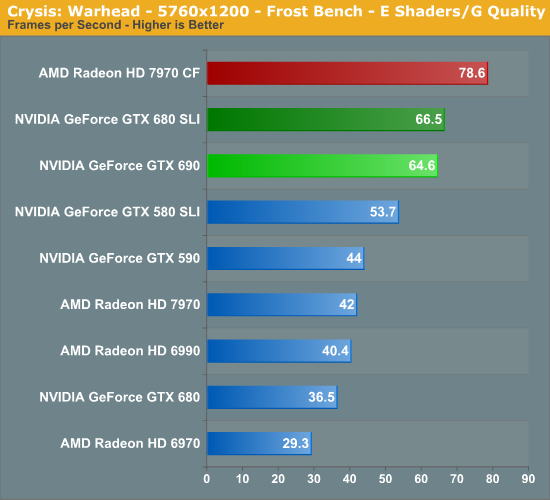
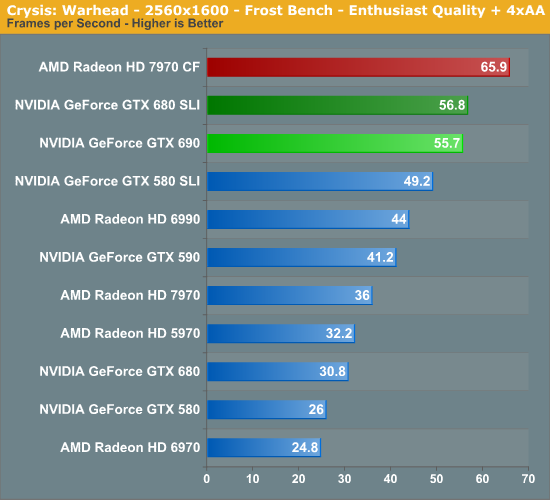
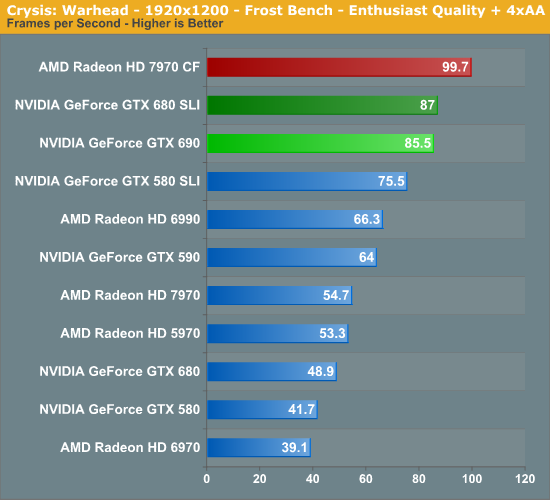
Crysis was a game that Kepler didn’t improve upon by a great deal compared to the Fermi based GTX 580. NVIDIA sees some good SLI scaling here, but AMD’s performance lead with a single GPU translates into an equally impressive lead with multiple GPUs; in spite of all of its capabilities the GTX 690 trails the 7970CF by 18% here. So long as AMD gets good Crossfire scaling here, there’s just no opening for Kepler to win, allowing AMD to handily trounce the GTX 690 here.
As for the intra-NVIDIA comparisons, the GTX 690 does well for itself here. Performance relative to the GTX 680 SLI at 2560 is 98%, which represents a 77% lead over the GTX 680. Overall performance is quite solid; at 55.7fps we’re nearly to 60fps on Enthusiast quality at 2560 with 4x MSAA, which is the holy grail for a video card. Even 5760 is over 60fps, albeit at lower quality settings and without AA.
It’s taken nearly 4 years, but we’re almost there; Crysis at maximum on a single video card.
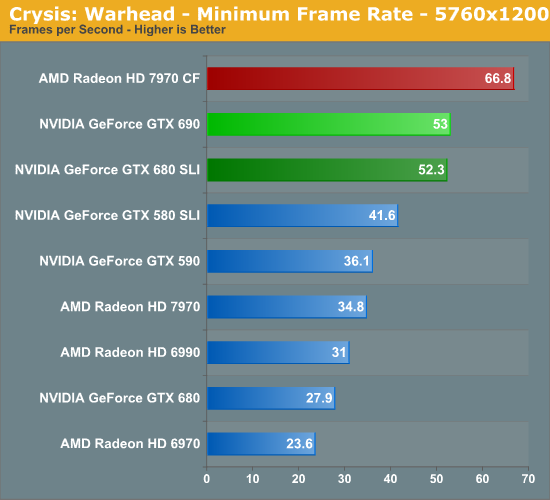
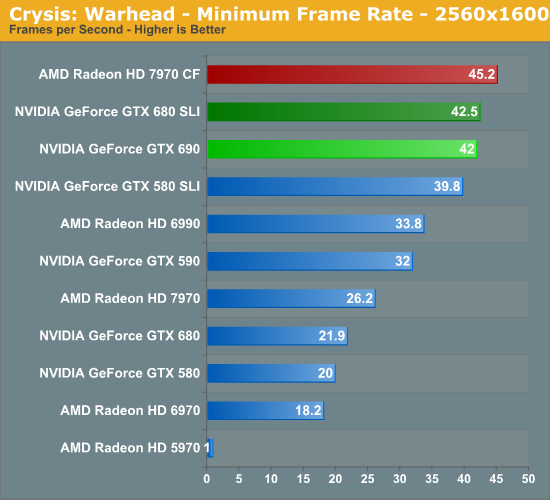
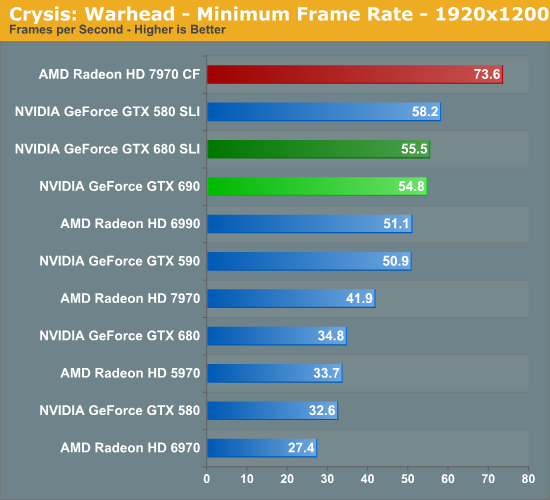
Our minimum framerates are much the same story for NVIDIA. The GTX 690 once again just trails the GTX 680 SLI, while interestingly enough the dual-GPU NVIDIA solutions manage to erode AMD’s lead at a single point: 2560. Here they only trail by 8%, versus 20%+ at 5760 and 1920. Though at 1920 we also see another interesting outcome: the GTX 580 SLI beats the GTX 680 SLI and GTX 690 in minimum framerates. This would further support our theory that the GTX 680 is memory bandwidth starved in Crysis, especially at the lowest performance points.










200 Comments
View All Comments
chadwilson - Thursday, May 3, 2012 - link
OpenCL by it's very nature is open, it is not an AMD API.CeriseCogburn - Friday, May 4, 2012 - link
Not after amd gets through with it.silverblue - Friday, May 4, 2012 - link
We'll see once somebody posts benchmarks of it.CeriseCogburn - Friday, May 11, 2012 - link
Excuse me but you're wrong, again." by Ryan Smith on Thursday, May 10, 2012
According to WinZip it only supports AMD GPUs, which is why we're not using it in NVIDIA reviews at this time. "
Ryan's comment from the 670 release review.
chadwilson - Friday, May 4, 2012 - link
You haven't bothered to do even the most basic research as to who owns OpenCL have you? Perhaps you should visit google before posting hyperboleCeriseCogburn - Saturday, May 5, 2012 - link
I'm sure the gamer's manifesto amd company "ownz it" now, and also certain it has immediately become all of yours favorite new benchmark you cannot wait to demand be shown here 100% of the time, it's so gaming evolved.CeriseCogburn - Friday, May 11, 2012 - link
Here's some research mt know it all: " by Ryan Smith on Thursday, May 10, 2012According to WinZip it only supports AMD GPUs, which is why we're not using it in NVIDIA reviews at this time. "
--
Congratulations on utter FAIL.
eman17j - Sunday, August 19, 2012 - link
look at this websitehttp://developer.nvidia(dot)com/cuda/opencl
prophet001 - Thursday, May 3, 2012 - link
First off, thank you for this review. If you didn't do this, we'd have no idea how these GPUs perform in the wild. It is very nice to come here and read a graph and make educated decisions on which card we should purchase. It is appreciated.The one thing that I wanted to question is why you feel that you can't recommend the 7970. At the very least perhaps the recommendation of which card to get should be based on the game you're playing.
Reviewing the data you published, the average frame rates for the 5 top performers over all bench marks are;
680 SLI 119 fps
690 GTX 116 fps
7970 CF 103 fps
680 GTX 72.9 fps
7970 65.5 fps
Also, the number of times which the 7970 dipped below 60 fps in the benchmarks (excluding the minimum frame rate benchmarks) alone, without the 680 doing the same was 4. This is over 29 benchmarks and some of the dips were minimal.
This aligned with the price considerations makes me wonder why one wouldn't consider the 7970?
Ryan Smith - Thursday, May 3, 2012 - link
"The one thing that I wanted to question is why you feel that you can't recommend the 7970. At the very least perhaps the recommendation of which card to get should be based on the game you're playing."Under normal circumstances we would do this. For example GTX 570 vs Raadeon HD 6970 last year; the two traded blows often enough that it came down to the game being played. However the key was that the two were always close.
In 20% of our games, 7970CF performance is nowhere close to GTX 690 because CF is broken in those games. It would be one thing if AMD's CF scaling in those games was simply weaker, but instead we have no scaling and negative scaling in games that are 5+ months old.
For single card setups AMD is still fine, but I cannot in good faith recommend CF when it's failing on major games like this. Because you never know what games in the future may end up having the same problem.